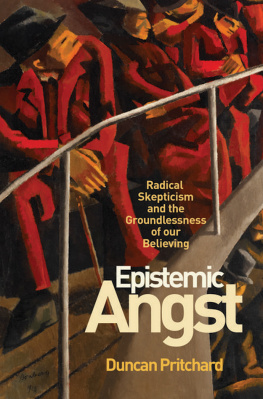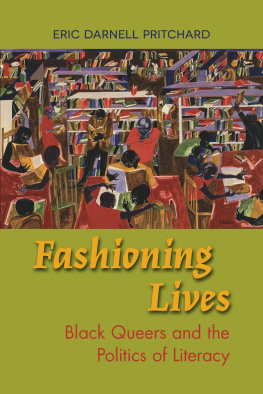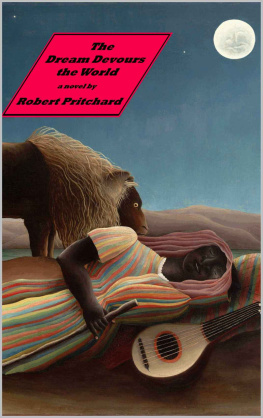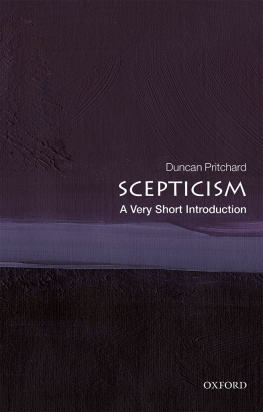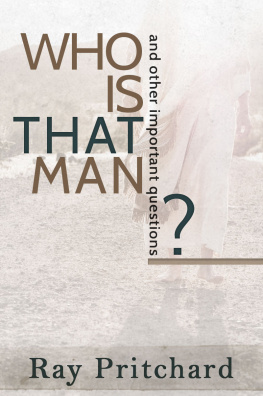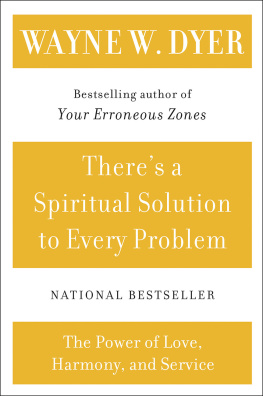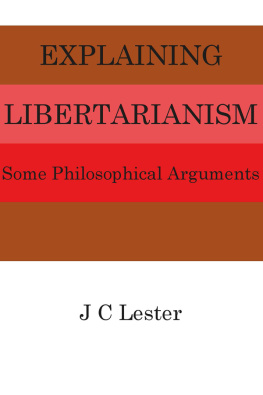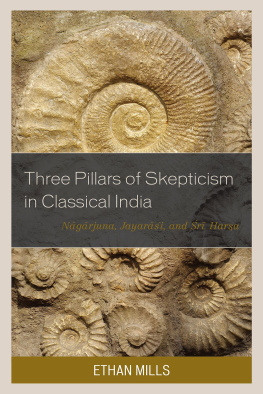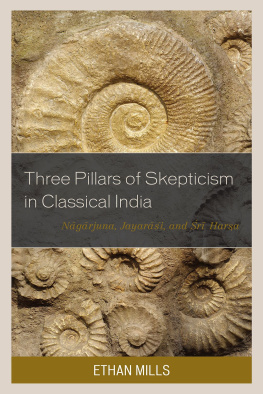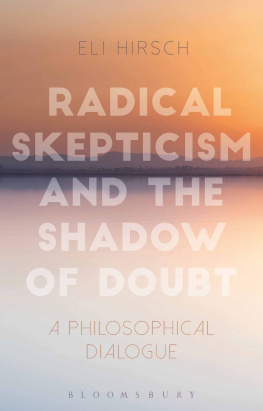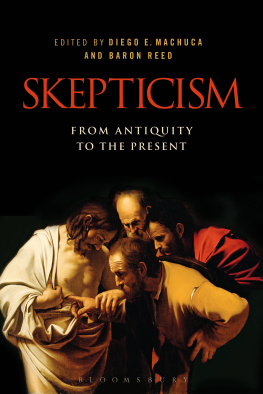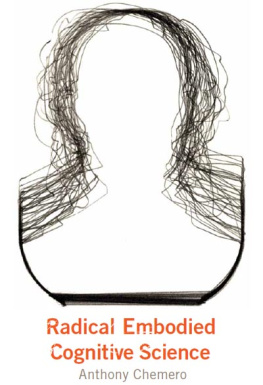
Epistemic Angst

Soochow University Lectures in Philosophy
Chienkuo Mi, General Editor
The Soochow University Lectures in Philosophy are given annually at Soochow University in Taiwan by leading international figures in contemporary analytic philosophy.
Also in the series:
Robert Audi, Moral Perception
Scott Soames, What Is Meaning?
Ernest Sosa, Knowing Full Well
Epistemic Angst
RADICAL SKEPTICISM AND THE GROUNDLESSNESS OF OUR BELIEVING

Duncan Pritchard
PRINCETON UNIVERSITY PRESS
PRINCETON AND OXFORD
Copyright 2016 by Princeton University Press
Published in association with Soochow University (Taiwan)
Published by Princeton University Press, 41 William Street, Princeton, New Jersey 08540
In the United Kingdom: Princeton University Press, 6 Oxford Street, Woodstock, Oxfordshire OX20 1TW
press.princeton.edu
Jacket art: Ghetto Theatre by David Bomberg. Courtesy of the Ben Uri Gallery and Museum, London.
All Rights Reserved
Library of Congress Cataloging-in-Publication Data
Pritchard, Duncan.
Epistemic angst : radical skepticism and the groundlessness of our believing / Duncan Pritchard.
pages cm. (Soochow University lectures in philosophy)
Includes bibliographical references and index.
ISBN 978-0-691-16723-7 (hardcover : alk. paper) 1. Skepticism. 2. Knowledge, Theory of. 3. Belief and doubt. I. Title.
B837.P75 2016
121dc23
2015005925
British Library Cataloging-in-Publication Data is available
Clarke epigram appears courtesy of the Journal of Philosophy 1972.
Wittgenstein epigrams appear courtesy of Blackwell 1969.
This book has been composed in Sabon LT Std
Printed on acid-free paper.
Printed in the United States of America
10 9 8 7 6 5 4 3 2 1
For Mandi, Ethan, and Alexander

What is the skeptic examining: our most fundamental convictions, or the product of a large piece of philosophising about empirical knowledge done before he comes on stage?
Thompson Clarke, The Legacy of Skepticism, 754
Contents

Acknowledgments

THE PROBLEM OF RADICAL SKEPTICISM is a topic that Ive worked on, intermittently, for about twenty years, and hence there are a lot of people I should acknowledge. To begin with, Id like to mention those philosophers whose work has been such a big influence on my thinking in this regard. That the work of John McDowell falls into this category will be obvious to any reader of this book. Less obvious, but no less significant, is the work of Michael Williams and Barry Stroud, and in particular their (respective) groundbreaking books, Unnatural Doubts and The Significance of Philosophical Scepticism. Although I think that these works are in some fundamental ways mistaken, the careful reader will probably be aware they frame a good deal of my thinking about radical skepticism.
Although I would probably have written this book eventually, what stimulated me to write it when I did was the wonderful invitation to deliver the 2013 Soochow University Lectures in Philosophy, a lecture series that is held annually in Taipei. It was vital to these lectures that a Chinese translation of the lectures appeared above me as I spoke, which meant that there really was no alternative to writing each lecture out in full well in advance of its delivery (my normal practice is to talk to the handout/PowerPoint when giving research presentations, and only writing the piece up once I am satisfied that it has been sufficiently exposed to philosophical critique). Delivering these lectures was a fantastic experience. A great deal of the thanks for this goes to the magnificent hospitality of Chienkuo Mi, who runs this lecture series, and who I am now pleased to count as a good friend. But everyone in Taipei was wonderfully supportive and made my stay there a delight. I should especially thank the translators of my lectures: Chienkuo Mi, Hao-Cheng Fu, and Wen-Fang Wang. Thanks also go to Cheng-Hung Tsai, Christian Wenzel, Rita Lin, Wen-Fang Wang, and Wei-Ping Zheng. Finally, I am grateful to the National Science Council (NSC 102-2912-I-031-502) and Archie Hwang (chairman and CEO of Hermes-Epitek Corporation) who generously sponsor the Soochow University Lectures in Philosophy series.
Having drafting this book in preparation for the Soochow lectures, a second piece of good fortune came along, in that Thomas Grundmann asked me whether I would be willing to have my work the subject of the 2013 Summer School in Philosophy, an event that is held annually at the University of Cologne. The timing could not have been better, since it meant that I had the chance to revise my Soochow lectures in response to their outing in Taipei and then subject them to another intensive grilling in Cologne. Thomas was a fantastic host, and he and the rest of the participants kept me on my toes throughout. Special thanks go to Tim Kraft, Andrew Kruse, and Michael Veber. Thanks also to Cameron Boult, Elke Brendel, Gerhard Heise, Dirk Koppelberg, Chris Ranalli, Stephen Wright, and to Klner Gymnasial- und Stiftungsfonds, and its executive director Thomas Erdle, for funding the lectures.
My original intention was to finalize the book after the Cologne summer school, but while this did prompt me to produce a new version of the manuscript, further good reasons emerged to delay the final push. The first was that in early 2014 my manuscript was chosen as the subject of the Edinburgh Epistemology Reading Group, which gave me an opportunity to work through the material with colleagues and PhD students. Many thanks to Jie Gao, who was the organizer of this group, and also the participants: Natalie Ashton, J. Adam Carter, Mikkel Gerken, Sandy Goldberg, Orestis Palermos, Stephen Ryan, Dory Scaltsas, Ben Sworn, Kevin Wallbridge, and Ju Wang. In addition, I was fortunate in the spring semester of 2014 to be able to structure an advanced course on skepticism around this manuscript, and thereby put research-led teaching into action. Im very grateful to the students in this course for their engagement with the text, particularly Matthew Bixby, Ewa Jonczyk, and William Kinzelman.
I wasnt expecting the material in this book to get another outing before it was finalized, but by good fortune it did, at the conference on Skeptical Solutions: Provocations of Philosophy, which was held at the University of Bonn in November 2014. Special thanks to the organizers, G. Anthony Bruno and Abby Rutherford. Thanks also to Donald Ainslie, Jim Conant, Michael Forster, Markus Gabriel, Hannah Ginsborg, Andrea Kern, Sebastian Rdl, and Owen Ware.
Ive been very lucky in receiving detailed comments on earlier drafts of the book from several people. These include Modesto Gmez Alonso, J. Adam Carter, Gregory Gaboardi, Changsheng Lai, Kevin McCain, Peter Murphy, Genia Schnbaumsfeld, Alan Thomas, and two anonymous referees from Princeton University Press. Ive also had some very fruitful conversations about core elements of the book with Sandy Goldberg, John Greco, and Ram Neta. Im particularly grateful in this regard to Ernie Sosa, who not only provided very detailed comments on an earlier draft of the book, but also has been supportive of the project throughout. Indeed, in general (i.e., and not just with regard to this book), I owe a great debt of thanks to Ernie (as Im sure many epistemologists of my generation do). His work has been a tremendous influence upon my development, to the extent that I think it is fair to say that I view much of the epistemological literature through the lens that he has provided with his own stimulating and game-changing contributions to the field. But, more than that, Ernie has been a constant source of encouragement, and I feel very fortunate to have benefited from his wise counsel.
Next page
